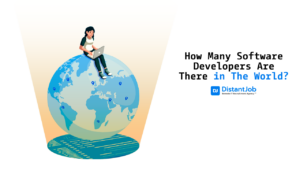The second half of January 2017 has certainly been one of the most hectic periods in North-American history in recent memory. Among several controversial executive orders passed by President Trump, the work visa executive order – the one that imposes limits on the H-1B visa – has led many businesses and startups to express concern about their ability to access the worldwide talent pool. Others – while still concerned about the social impact of the executive order – feel pretty good about their recruiting prospects. What is the source of their bullishness? They have embraced and invested early in remote workers.
The great thing about true globalization is that it is without borders. This might be difficult to achieve in the physical, geographic representation of the world, where politics and economics remain firmly rooted in old conceptions, but the same is not true of the Internet. The World Wide Web is now, more than ever, a place of free trade – of ideas, ideals, and good, reliable professional skill.
Over the years, we have exalted the practice of hiring remote workers for many reasons: it makes sense economically for both the employer and the employee; it leads to superior work/life balance; it results in a more diverse business with access to a wider pool of talent and the freshness of ideas that comes from mingling with other cultures. It leads to higher quality work, full stop.
What we didn’t really focus on, because we didn’t imagine it would be especially relevant, is that businesses that adopt the practice of hiring remote workers are also immune to the fallout from things like President Trump’s work visa executive order.
Remote Workers are Immune to the Work Visa Executive Order
A remote employee does not need a work visa of any kind. He will be working from whatever country he wishes – wherever he feels safer and happier – and the company that he works for is not hostage to the whims of presidential fancy or political law-making. By hiring remote workers, a company can get top talent from any country, without getting bogged down by bureaucratic devices like the need for a H-1B visa.
There are high-quality employees waiting to be found and hired all across the world – and you can expect from them as much or more than you would expect from a regular, in-house employee, and all this without even having to rely on expensive recruitment and employee acquisition programs that can, at the last minute, be shut down by a visa check.
It’s time to let go once and for all of the myth that people need to be under the same roof to share your company culture. Companies like Automattic are ample proof that the best businesses are global. And not only do they thrive due to this, they are also immune to geo-political challenges like the ones many North-American companies are facing today.
Globalization is more than free movement of people between physical borders. It is about free trade of ideas and skills. If you want your business, your startup, to be truly global and resistant to isolationism, then you need to start hiring remote workers.




